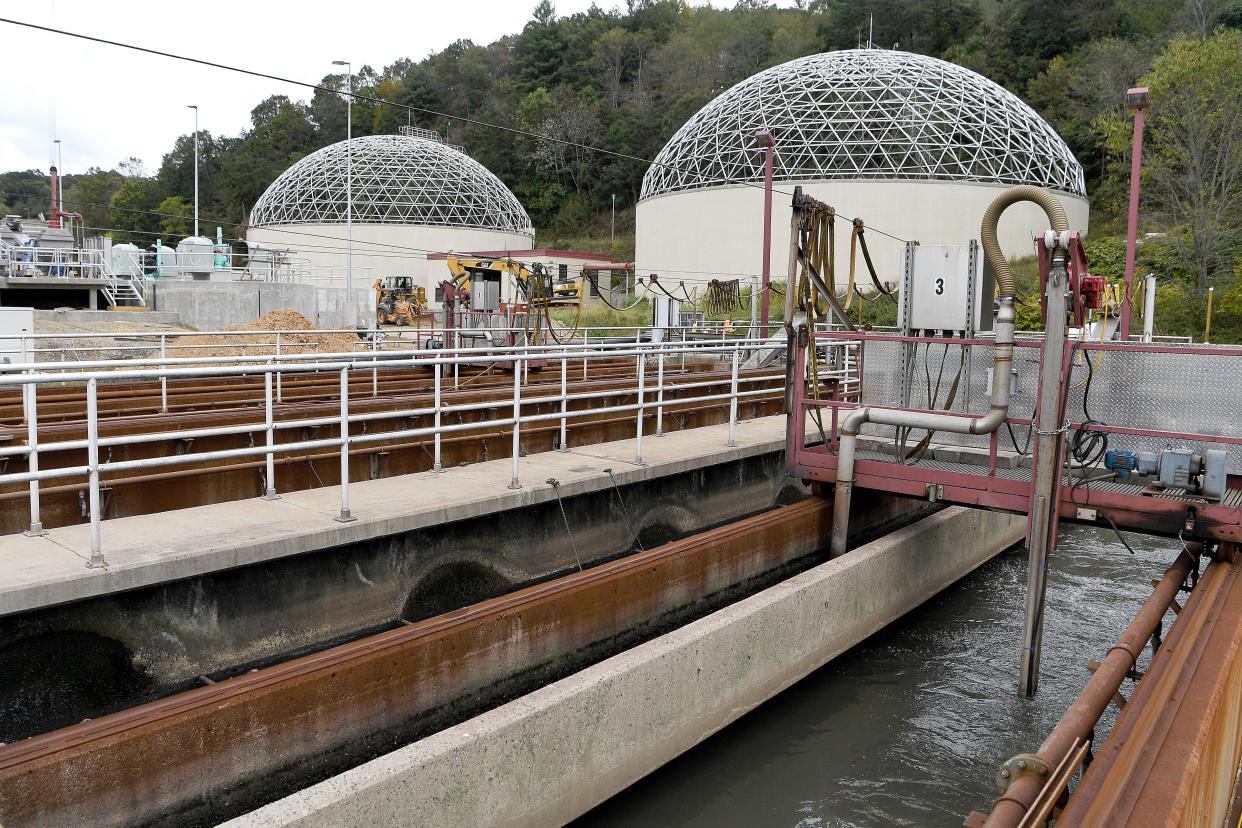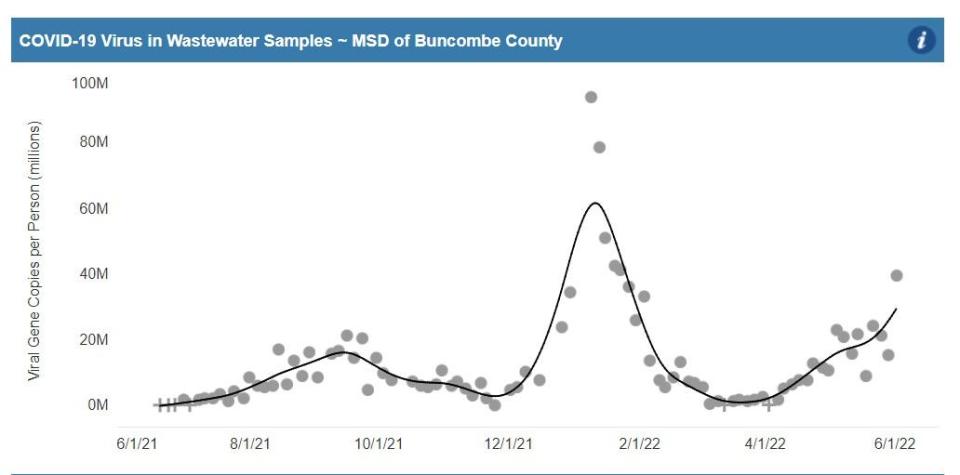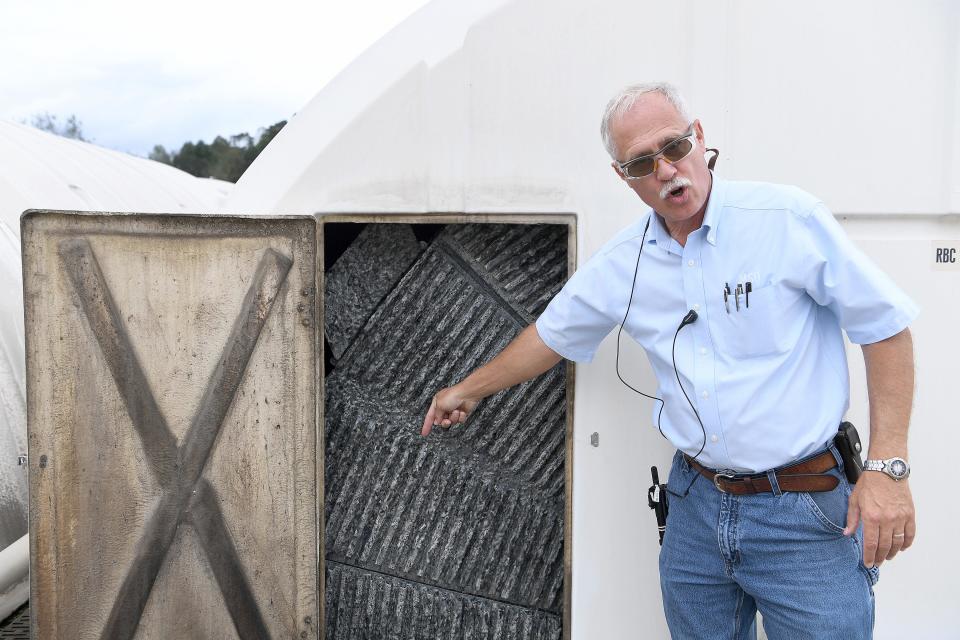COVID wastewater level recently doubled in Buncombe's sewer district. What does that mean?

ASHEVILLE – COVID-19 wastewater samples used to collect information about the trajectory of the pandemic in Buncombe County and surrounding areas recently spiked, according to the North Carolina Department of Health and Human Services.
Wastewater plants collect that data because people infected with COVID shed the virus in their feces shortly after they are infected, which health officials say can be a more accurate indicator of how many cases are actually in a community.
Wastewater numbers posted to the NCDHHS COVID data dashboard June 1 are the most up-to-date information available for the Metropolitan Sewerage District of Buncombe County, which serves 173,000 in Buncombe and Henderson County and sends samples off to local labs on a consistent basis.
"It's once a week at most," said General Manager Tom Hartye. "I think we were doing once every two weeks early on."
Between May 28 and June 1, the MSD of Buncombe recorded a spike of roughly 25 million viral gene copies per person, ballooning from 15 million to 40 million in that short time period.
The MSD of Buncombe measured a 2022 low 0.98 million viral gene copies per person on March 20.
At its record 2022 high, wastewater samples measured 98 million viral gene copies per person on Jan. 8.

The numbers emerge at the same time Buncombe cases have slightly ticked up in recent weeks, especially following the Memorial Day holiday.
Buncombe Public Health Director Stacie Saunders was traveling and not immediately able to respond to questions about the wastewater spike, but has addressed community COVID increases in recent reports to the county's Board of Commissioners.
More about COVID-19's recent impact on Buncombe County:
Following national trend, Buncombe COVID-19 cases on the rise though hospitalizations are low
Answer Man: COVID-19 testing at the wastewater plant? Biltmore Estate security issue?
Buncombe health department to decrease public COVID-19 updates; positivity rate falls to 4.7%
Buncombe COVID-19 percent positivity numbers receding back to pre-Thanksgiving 2021 levels
Buncombe commissioners let COVID-19 mask mandate expire, approve landfill expansion
"It's not terribly unexpected that we might see an uptick in cases given the holidays and the spring break activities, given that more people are interacting with each other, spending time with each other, they tend to gather and travel to and from our community," she said in May
Saunders also said in early June she was "cautiously optimistic" about the pandemic's local trends, despite the fact Buncombe like many other North Carolina counties had moved from the CDC's 'low' risk category for COVID-19 strain on medical systems to a "medium" risk level.
This happened around the same time wastewater numbers went up.
This can be a helpful measure of how the virus is spreading in communities, especially given not all at-home positive COVID tests get reported to the local or state health departments.
"To better understand COVID-19 in North Carolina, NCDHHS is testing samples of wastewater from select wastewater treatment plants across the state to look for SARS-CoV-2, the virus that causes COVID-19," NCDHHS explains on its wastewater reporting website.

"Testing wastewater for these viral particles allows us to track COVID-19 trends among people contributing to the wastewater. Data from these sites serve as a supplemental metric to understand the impacts of COVID-19 at the community level."
According to the CDC, ongoing collection of this data provides data to complement testing, including:
An efficient community sample.
Data for communities where timely COVID-19 clinical testing is underused or unavailable.
Data for different communities within a county.
Additionally, wastewater data is "most useful when used with other data," the CDC says, noting it's also a good indicator of how localities are tackling virus prevention.
"Communities may see change in the virus wastewater levels as prevention strategies in their areas change."
The CDC's own wastewater data tracker measures viral gene copies throughout the nation, pulling data from a variety of sites, including the MSD of Buncombe County.
Currently, 773 reporting sites in the U.S over the past seven days show a general decline in virus levels.
As of the week ending in June 4, the total number of COVID cases measured through traditional nasal swab testing was 604 — including 53 reinfections — down from 740 the week before.
A total 595 people in Buncombe have died from COVID-related symptoms since the start of the pandemic in 2020.
Though federal, state and local officials have pulled back on COVID reporting, officials are encouraging people to use common sense and available resources to keep from being infected with the virus and keeping up to date on local numbers.
"We are beginning to learn how to normalize our lives with COVID-19 likely to be around for the foreseeable future," Saunders said in a June news release, her last on COVID-19 until September.
"This means riding out waves of cases with the tools we have like staying up to date on vaccines, utilizing testing options for quick identification, adding on additional precautions like masks and distancing when transmission is higher, and accessing treatment quickly if we are at risk for severe illness. It also means reducing and increasing the level of all of those tools and communications based on level of surges."
Residents can still visit vaccines.gov to find other nearby vaccination clinics and covid19.ncdhhs.gov for testing sites.
Andrew Jones is an investigative reporter for the Asheville Citizen Times, part of the USA TODAY Network. Reach him at @arjonesreports on Facebook and Twitter, 828-226-6203 or arjones@citizentimes.com. Please help support this type of journalism with a subscription to the Citizen Times.
This article originally appeared on Asheville Citizen Times: COVID-19 wastewater testing numbers skyrocketed June 1 in Asheville

